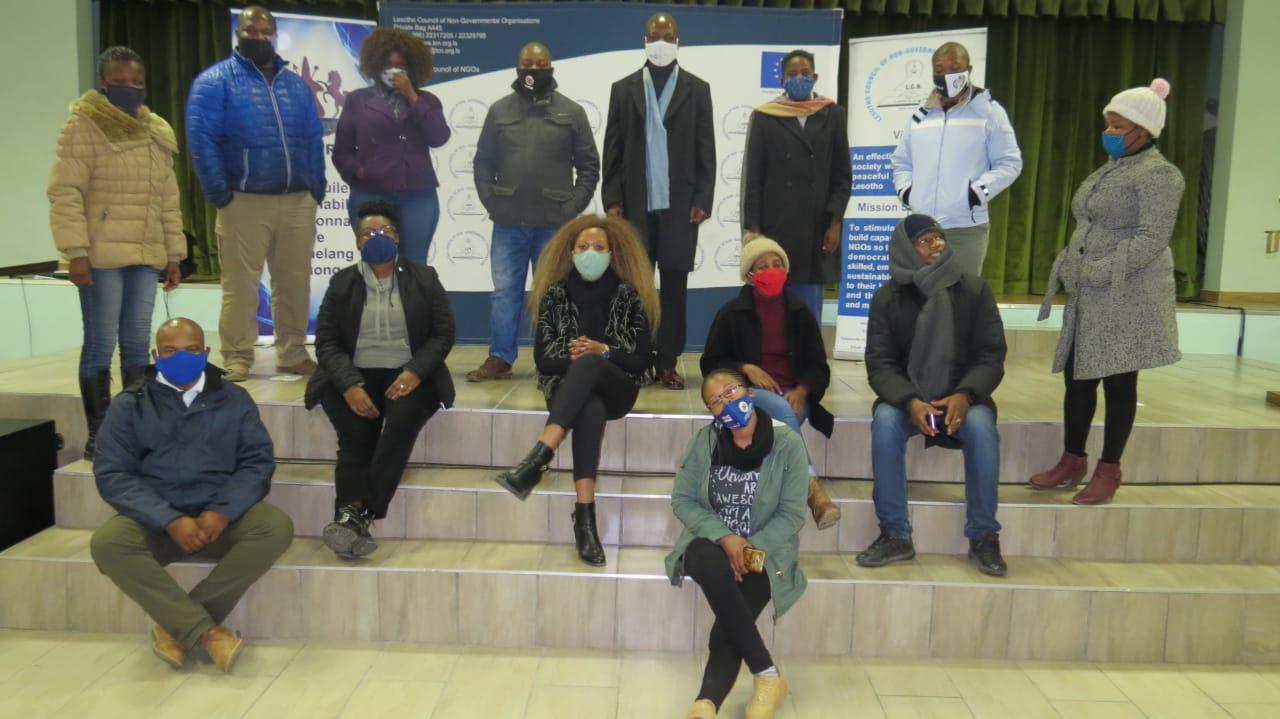Africa-Press – Lesotho. An initiative to increase the quality of media coverage on gender based violence (GVB) issues took place this week. The joint civic movement and media event sensitised reporters on issues and the challenges faced in coverage.
According to the UNFPA handbook for Journalists on GBV Sensitive Reporting, the term GBV is most commonly used to refer to violence perpetrated against women and girls.
The three-day training challenged the normalisation of GBV in new content, capacitated reporters to write news stories from a human rights based perspective and gender parlance as well as writing victim oriented news-stories from different voices and orientation.
The training was by a partnership by the Lesotho Council of NGOs (LCN) and the government’s Ministry of Gender, with the Media Institute of Southern Africa, Lesotho chapter, (MISA Lesotho) co-ordinating the media personnel.
Launching the training, MISA Lesotho highlighted the need for media houses to ensure an increase in reporting GBV-related issues during the ongoing COVID-19 lockdown that has seen a rise in GBV cases reported to the police.
“As MISA Lesotho we wish for all media houses to report GBV in large numbers, especially in this COVID-19 pandemic era when cases have risen,” Director, Lekhetho Ntsukunyane, said.
Ntsukunyane revealed that the institute was in the process of sourcing support from government, donor partners and international organisations to deploy news reporters across the country during the on-going lockdown to ensure widespread coverage on the impact of the pandemic on society.
He said there was serious need to report news from the villages and hear all that communities have to say on GBV and the COVID-19 pandemic. “MISA is just an advocacy organisation, and we have a challenge as an institution because we have turned into a jack-of-all-trades when it comes to media issues in the country.
“And only because we are the only organisation still in action whereas other media structures such as the Journalists Union of Lesotho, the Editors Forum of Lesotho and Women in Media Association died and should be re-established so that critical matters like GBV are tackled from all angles,” he added.
LCN Women and Children Co-ordinator, Mantšalla Ramakhula, noted at the same gathering that the plan to host such training was driven by the realisation that GBV victims were always subjected to repeated abuse and pain because of the manner their issues are reported in the media.
“Journalists also fail to include different necessary voices in their presentations, and this is an injustice to the already victimised individuals…as reports are almost always one-sided,” she said.
Ramakhula also criticised a recent Lesotho Television June 27 prime time news broadcast that shocked the entire country, in an report about news of a 14-year-old girl of Ha ’Nyane, Thaba-Tseka who was reportedly raped by her father.
In an accompanying insert a man identified by the broadcaster as Moeketsi Tšolo, literally absolved the rapist father. Tšolo blamed women and the 14-year-old rape victim, arguing women leave their homes to go and seek employment leaving men with girls who are dangerous as “they have become sexually ripe.
” And while the man’s utterances were extensively rebuked, the spotlight fell on Lesotho Television for broadcasting such despicable sentiments, with some commentators reacting in the public space that “giving publicity to these is making the broadcaster a platform fertile for a metastatic process of a deadly narrative.
” Ramakhula added said it was unfortunate that the community was subjected to utterances of the nature broadcast by the Lesotho Television and that men ought to know the difference between their wives and their daughters.
She further highlighted the plight of most children who find themselves faced with sexual assault and harassment emanating from their continued stay at home with parents, as a result of the COVID-19 national lockdown. She noted, in the same vein, that some of those assaulted are children left alone because of parents are trying to make a living.
Mosiuoa Ramakoele, training facilitator from the gender ministry, told the trainee reporters that correct and quality approaches to writing news stories could only be achieved through proper selection of sources for stories, fair portrayal of women and men through elimination of stereotypes, use of gender fair language and the promotion of gender equality within media organisations.
“Fair gender portrayal is a professional and ethical aspiration, similar to respect for accuracy, fairness and honesty. It can importantly contribute and co-create more gender balanced and inclusive societies,” said Ramakoele.
“Media has an influential role on perceptions and discourse around gender dynamics set in play in societies; more importantly, media can play a preventative and critical role in how people think about themselves and the world around them in relation to gender,” shared Luxolo Mtomela, technical advisor for partnership for prevention of violence against women and girls in Southern Africa.
She said she would love to see journalists report on how the COVID-19 impacted differently on everyone differently. “Interview women as sources of news to ensure women, girls and non-conforming persons’ voices are heard.
Highlight the high levels of gender-based violence. Give the public information on how they can assist survivors of GBV and where survivors of GBV can get help.
“Highlight the role men can play to assist to alleviate the gendered impacts of COVID-19, for instance, by assisting with the burden of unpaid care work in the home,” she said.
In an opinion article carried by this paper last week gender activist, Seabata Makoae, censured the Lesotho Television for failing to apply a principled editorial policy and position with regard to GBV Sensitive Reporting.
Such a dereliction of duty and lack of due care and diligence can have long and lasting social consequences of perpetuating toxic masculinities and help in perpetuating sexual violence against women and girls, Makoae asserted.
Makoae is a social worker, a gender activist and co-ordinator for MenEngage Network-Lesotho – a network of organisations and associations whose purpose is to engage men and boys in efforts geared towards the promotion and protection of the rights of women and girls.
“This promotes and glorifies wanton norms in a country that boasts, with shamelessness, the highest per capita rate of violence against women and girls, behind South Africa and Botswana.
By this failure Lesotho Television has managed to reinforce dangerous misconceptions and negative notions of manhood, including that men cannot control their sexual urges to the point that men view their daughters as sexually ripe and due for violation that offends every decent human sensibility,” Makoae said.
According to the activist the subordinate role of females in society is seen as a root cause of GBV and gender discrimination contributes to acts of GBV being ignored and a lack of support for survivors, and “this is exactly what Lesotho Television failed to take into account.
” According to the Lesotho Gender and Development Policy (2018-2030) GBV, in its various forms, is endemic in communities around Lesotho, and that its impact resonates in all spheres of society, including political, economic and social.
“While women constitute the majority of victims and are the most visible survivors, they are not the only ones suffering consequences of GBV; gender-based violence against men is also experienced in Lesotho though men do not openly report,” reads the report.
“Boys and girls amount to a big number reporting for medical and police services due to GBV. People with disabilities, LGBTI people and the elderly, mostly women, are also disproportionally affected by GBV.
Epidemiological evidence shows that violence is a major cause of ill health high mortality and disabilities as a result of injuries among women and girls.
It is widely acknowledged that media has an important role to play in influencing policies, social norms, attitudes and practices related to equality between and among men, women, boys, girls and other marginalized groups,” it highlights.
The policy document observes, however, that the media has great potential to promote a positive image of women and other marginalized groups. It notes also that the media could perpetuate cultural, social, political and economic stereotypical attitudes and practices, by projecting negative and degrading images of women and other marginalised groups.
For More News And Analysis About Lesotho Follow Africa-Press






